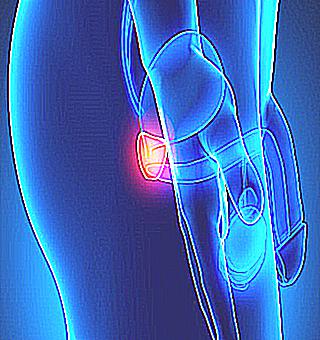Home >
Erectile Dysfunction >
Influence of prostatitis on potency
Influence of prostatitis on potency

Prostatitis is a male disease when the prostate gland is exposed to an inflammatory lesion. The prostate is an element of the male reproductive organs. Increased pressure on the prostate leads to compression of the urinary tract and difficulty urinating.
This pathology is widespread and occurs in 80% of sexually mature men. The disease is common among patients between the ages of 20 and 45. Often, older men suffer from symptoms of prostatitis due to progressive congestion in the groin area or after the onset of prostate adenoma.
Complications and consequences
Doctors express rather favorable prognosis for prostatitis, if the patient receives timely medical care. If adequate treatment is not provided, then the pathology is transformed into a chronic form. Such unwanted complications develop as:
- abscesses, that is, purulent fusion of the prostate tissue
- sclerosis of the prostate
- inflammatory lesions in the kidneys and bladder, rectum and urethra
< li>mental instability - infertility and impotence
Influence of infection on potency
Erectile dysfunction develops in men suffering from chronic prostatitis. About 30% of men with prostate lesions report premature ejaculation and decreased erection strength. The weakening of sexual ability occurs gradually. After the development of severe problems in the intimate sphere, a man begins to lose sexual desire. Among the main reasons causing a decrease in potency, a violation of neurohumoral regulation is called, when signals of arousal are not transmitted to the muscles and vessels of the pelvic organs. Prostatitis causes muscle tissue damage in the lower pelvis. The patient experiences psychological stress, nervousness, increased anxiety and fear of failure.
Prostatitis symptoms
You can suspect the development of an inflammatory process in the prostate by the following characteristic symptoms:
- headaches, increased fatigue and irritability;
- frequent, difficult urination, which is accompanied by painful sensations. Urine comes out in small portions, often patients cannot independently control the process of urination. In some cases, there is an acute urinary retention that occurs after prostate edema, which compresses the urethra. The man feels frequent urge to go to the toilet due to incomplete emptying of the bladder;
- the presence of blood and white flakes in the urine;
- burning sensation in the perineum and rectum during bowel movements. If the disease reaches the stage when the abscess spontaneously opens, then pus is released from the urethra or rectum;
- pain in the perineal region. There is a dull, aching pain;
- increased body temperature (up to 38-40C). The condition is accompanied by general weakness and chills, severe thirst and dry mouth.
Causes of Prostate Disease
Infection Methods
Inflammatory disease of the prostate gland occurs as a consequence of:
- penetration of infection (pathogenic microorganisms) into the prostate tissue. Infection occurs along a descending pathway during inflammatory processes in the bladder and kidneys. The defeat develops along the ascending (urethrogenic) pathway, when the pathogenic flora spreads from the urethra with urethritis. Hematogenous injury occurs after transmission of an infection from the respiratory tract, kidneys, or gastrointestinal tract;
- non-infectious tissue damage. The disease develops as a result of an unsuccessful medical instrumental examination performed through the urethra.
Prerequisites for the development of prostatitis
The following negative factors contribute to the onset of acute inflammation and severe pain syndrome:



























